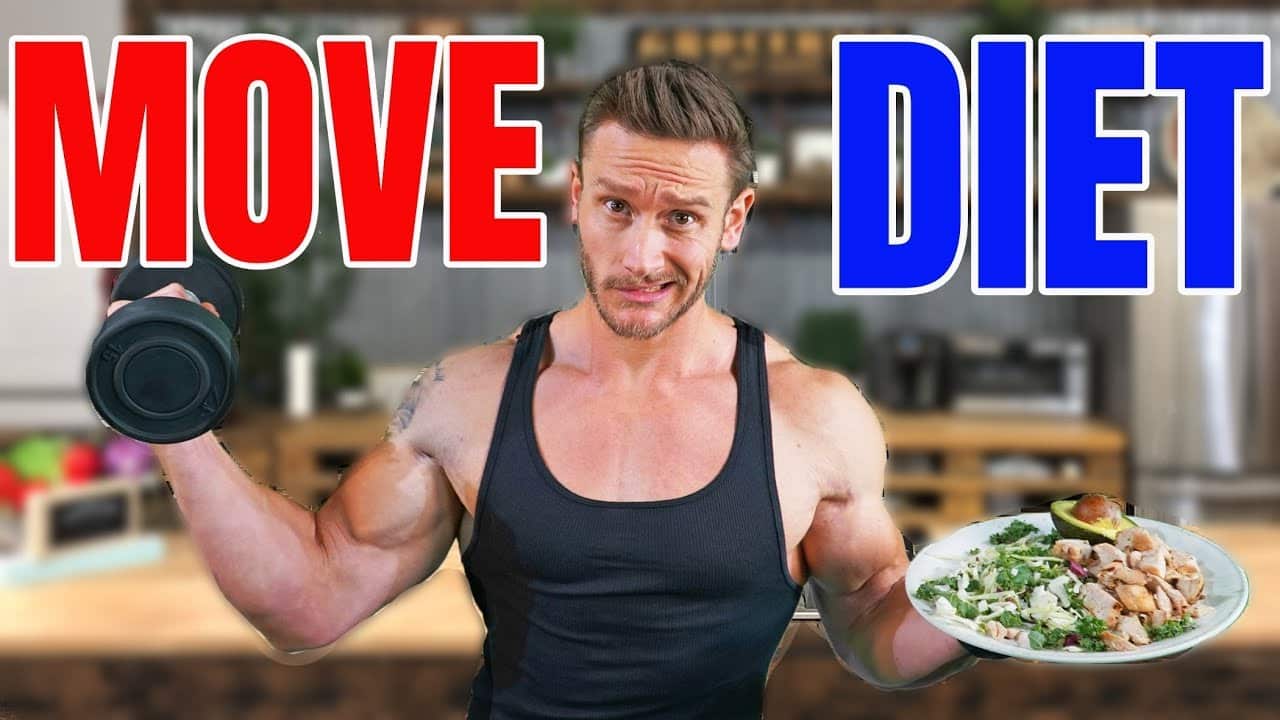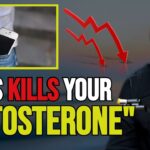*****
Summary of Transcript:
The video explores whether losing weight is easier by reducing calorie intake or increasing workouts. While it may be easier to lose weight in the short term through a caloric deficit, a study found that those who worked out more had less appetite and were likelier to lose weight over a long time. This is because exercise plays a role in regulating TRP V sensors that control appetite. The video suggests combining both approaches for sustainable weight loss and provides a game plan for continued fat loss. The video also promotes a discount link for Thrive Market groceries.
*****
Summary of Description:
The modality of an acute 3-day isocaloric 25% energy depletion by dieting alone or aerobic exercise alone affects appetite and appetite-related hormones, ad libitum feeding, food reward (snack points), and olfaction—acute caloric restriction results in rapid changes in appetite that result in compensatory eating. Exercise may stave off hunger more than diet alone due to body heat signaling the brain to decrease need. Capsaicin has been shown to reduce appetite. (POMC) neurons promote satiety as POMC neurons are believed to suppress appetite by releasing a neuropeptide called α-melanocyte stimulating hormone (α-MSH), an agonist at the anorectic melanocortin-4 receptors (MC4Rs). MC4Rs act on receptors in the hypothalamus in the brain to reduce appetite.
*****
How to Maximize Weight Loss: Diet vs. Workout Deficit – Thomas DeLauer
Losing weight is a challenge for many, and the debate between diet and exercise often arises. According to a study published in The American Journal of Clinical Nutrition, dieting may impact appetite regulation more than exercise alone. What works best to reach your weight loss goals?
The Study: Diet vs. Exercise
The study looked at ten male subjects and induced a 25% energy depletion by either dieting alone or aerobic exercise alone (or a combination of both) for three days. The results showed that dieting was more challenging to appetite regulation than exercise, leading to more significant appetite and ad-libitum eating. However, the study did not see any changes in leptin or ghrelin levels, two hormones that play a vital role in regulating appetite.
Exercise and Appetite
A study published in PLOS Biology found that exercise-induced body heat and capsaicin may play a role in appetite suppression. Capsaicin is a compound found in hot chili peppers that triggers a sensation of warmth and flushness. The study found that the capsaicin and heat-stimulated neurons called “proopiomelanocortin” (POMC) coordinate appetite suppression. These cells are found in a hypothalamus region known to suppress appetite.
The researchers exposed mouse hypothalamus tissue that contained POMC brain cells to capsaicin and heat. Both stimuli activated the POMC neurons, meaning that they had TRPV1 receptors. News sources covered the story with headlines like “Hot Yoga Could Slash Your Weight and Your Appetite.”
The Results: Exercise Suppresses Appetite
When the researchers put mice on treadmills, the exercise produced elevated body heat, decreasing appetite. This decrease in appetite was only observed in mice whose TRPV1 receptors were not suppressed. Exercising mice had an approximately 50% lower food intake after treadmill sessions.
The Bottom Line: Diet and Exercise Both Important
While the study showed that diet might impact appetite regulation more than exercise alone, it’s essential to note that both a healthy diet and regular exercise are important for weight loss. By creating an energy deficit through diet and exercise, you can achieve your goals while keeping your appetite in check.
*****
Source Description
Click Here to Subscribe: http://Bit.ly/ThomasVid
Get MY groceries at MY price with Thrive Market: http://ThriveMarket.com/ThomasDeLauer.
My Website: http://ThomasDeLauer.com
How to Maximize Weight Loss | Diet vs. Workout Deficit- Thomas DeLauer…
Study – The American Journal of Clinical Nutrition:
The objectives were to examine how the modality of an acute 3-day isocaloric 25% energy depletion by dieting alone or aerobic exercise alone affects appetite and appetite-related hormones, ad libitum feeding, food reward (snack points), and olfaction in 10 male subjects.
Two experimental conditions:
25% daily needs energy deficits induced by diet only (DIET) and by exercise only (EX) and tested before [day 1 of DIET (DIET1) and day 1 of EX (EX1)] and after 3 d [day 4 of DIET (DIET4) and day 4 of EX (EX4)] of the intervention.
Results:
DIET represented a more significant acute challenge to appetite regulation than EX, as demonstrated by greater appetite and ad libitum EI. Results confirmed that compared with depletions by exercise alone, critical caloric restriction results in rapid changes in appetite that result in compensatory eating. Note that no changes in leptin or ghrelin were seen in this study.
Exercise & Appetite:
Another study looking at the effects of exercise on the brain may explain why a solely exercise-induced deficit may stave off hunger more than diet alone. Body heat goes up during practice, which has now been found to play a role in signaling to the brain that appetite needs to go down. When we eat foods that contain hot chili peppers, our body temperature seems to go up, and our appetite decreases. That is because chili peppers contain a compound called “capsaicin,” which interacts with the body’s sensory receptors (TRPV1 receptors), bringing about the sensation of being hot and flushed. Capsaicin has been shown to create a decrease in appetite.
Study – PLOS:
Researchers focused on a set of neurons that coordinate appetite suppression, called “proopiomelanocortin” (POMC) neurons. These cells are found in a hypothalamus region known as the “arcuate nucleus, and the brain-blood barrier does not screen some. This membrane prevents most brain cells from being exposed to severe fluctuations in blood plasma composition, thus protecting neural function. But, since some POMC brain cells have more direct communication with the rest of the system and interact with hormones released into the blood, it was thought they might also be able to respond to fluctuations in body temperature. To test this hypothesis, the researchers first experimented with mouse hypothalamus tissue that contained POMC brain cells. They exposed this tissue first to capsaicin and then to heat, to see whether these cells could respond to both stimuli. The presence of heat and that of the chili pepper compound activated POMC neurons, meaning they had TRPV1 receptors. Researchers then conducted various mice tests to understand how POMC neurons reduced appetite after their TRPV1 receptors were activated. When they exposed the arcuate nuclei of mice to capsaicin, the animals tended to eat less food over the following 12 hours. The researchers, however, were able to block the loss of appetite associated with capsaicin exposure either by blocking the TRPV1 receptors of POMC neurons before administering the compound or by turning off the gene that encodes such receptors in mice. They then put some mice on treadmills, leaving them to run for 40 minutes – in this way, they created the conditions typical of a regular workout session. As a result of this exercise, the animals’ body temperatures initially shot up. Then they reached a plateau after 20 minutes – body heat remained high for over an hour, and the mice’s appetite visibly decreased. The exercising mice had an approximately 50% lower food intake after the treadmill session than their counterparts that had not taken part in the exercise. Finally, exposure to treadmill exercise did not affect the appetite of the mice whose TRPV1 receptors had been suppressed. This shows that heightened body heat due to physical activity stimulates relevant receptors in the brain to decrease the desire for food.
(POMC) neurons promote satiety as it’s believed that POMC neurons suppress appetite by releasing a neuropeptide called α-melanocyte-stimulating hormone (α-MSH), which is an agonist at the anorectic melanocortin-4 receptors (MC4Rs)
MC4Rs act on receptors in the hypothalamus in the brain to reduce appetite
Resources:
1) https://academic.oup.com/ajcn/article/103/4/1008/4564596
2) https://www.medicalnewstoday.com/articles/321660.php
3) https://journals.plos.org/plosbiology/article?id=10.1371/journal.pbio.2004399
4)https://www.ncbi.nlm.nih.gov/pmc/articles/PMC4436859/#__sec3title
5) https://www.ncbi.nlm.nih.gov/pmc/articles/PMC2014686/
Weight loss, maximize weight loss, diet vs. workout deficit, workout vs. diet, training, and diet plan to lose weight, exercise and diet, workout and diet plan, workout and diet for abs, diet deficit vs. workout deficit, diet or training for fat loss, workout and diet plan to build muscle, burn fat and build muscle, dieting or exercise for weight loss, workout deficit, calorie deficit, calorie deficit diet, calorie deficit explained,thomas delauer, keto, intermittent fasting.


Comments are closed